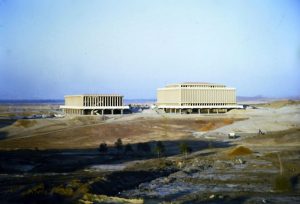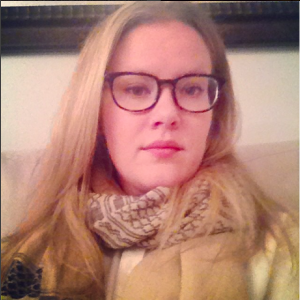
The view of Gateway Study Center and Langston Library from across the future Aldrich Park (1965). Image via UCI Department of Chemistry.
First off, I’d like to welcome you to the Humanities Core Course and to this experimental digital space, a curated group blog in which our course director, lecturing faculty, seminar leaders, students, and other members of the university community will reflect on this cycle’s theme of Empire and Its Ruins as well as our practices as writers and researchers in the Humanities at UC Irvine.
I also want to reassure those of you who are new to the idea of college-level writing and research in the humanities that everyone feels apprehensive at the beginning. Moreover, it is natural to find yourself unmoored along the way as your interests and scholarly pursuits develop. To use an old and rather tired cliché, academic research is a journey, not a destination.
When I first arrived at UC Irvine as a graduate student in the Department of Comparative Literature, I was terrified to venture onto the fifth floor of Langston Library, which houses the world-renowned Critical Theory Archive, a special collection of documents and artifacts that I had indeed come to Irvine in hopes of studying. I felt sure that I would be found out as a fraud, that the librarian would take one look at me and know that I was an academic imposter who was unprepared to examine the treasures she so carefully guarded. I am embarrassed to admit that it took me nearly six months to work up the courage to press the elevator button to the fifth floor. To my amazement, what I eventually found there was not Cerberus but rather a group of brilliant, dedicated archivists eager to share some of our school’s most precious resources with me. They listened to my ideas, asked questions about my project, and made invaluable suggestions about documents that I hadn’t even heard of before. As my thinking evolved, I returned again and again to the archive, often revisiting texts that I had looked at earlier with new eyes and different questions. Years later, it felt particularly fitting that it was on the fifth floor that I filed my doctoral dissertation, adding my own small contribution to the space from which I had learned so much.
In this blog, other members of our Humanities Core community will reflect on their own journeys as researchers and writers. They will tell you about their encounters with libraries and archival spaces and explain how particular artifacts captured their interest. They will introduce you to the exciting new world of scholarly resources online and share digitized archives that you may find helpful as you develop your own research projects in the spring. They will share stories of how they came to work in a particular discipline or interdisciplinary context, as well as detours that their careers took along the way. They will model how to close read artifacts from their own disciplinary perspectives, revealing how historians, literary scholars, philosophers, and art and media scholars might have highly divergent approaches to the same object. Scholars representing a range of interdisciplinary programs in the School of Humanities and Social Sciences—including African American Studies, Asian American Studies, Chicano/Latino Studies, Comparative Literature, Culture and Theory, European Studies, Gender and Sexuality Studies, and Persian Studies—will write about the social and political implications of their research, hopefully helping you to understand how the study of the humanities never takes place in a vacuum and often relates directly to the events that shape contemporary life.
The purpose of this space is twofold. First, we intend to model the kind of socially engaged, evidence-based speculative writing that students in Humanities Core will create in their own blogs over the course of the year. As a student in Core, you can learn a great deal about the appropriate tone and tenor of effective online academic writing from these posts, as well as how to approach an emergent, constantly changing online audience. We encourage you to join in the dialogue and debate that we hope will unfold in the comment section.
Perhaps more importantly, we hope that students in the program can better get to know their librarians, seminar leaders, and faculty lecturers through these posts. We want to demystify the process of doing research in the Humanities at UC Irvine. Even the so-called “experts” face new opportunities and challenges as technology advances and the social conditions in which we work as researchers change. While the various points of view reflected in this space do not necessarily represent UC Irvine or the administration of the Humanities Core Course, they do represent the work of the humanities today: to interpret human artifacts and the cultures from which they originate, to question how humans have understood history and collective agency, and to interrogate structures of marginalization and oppression.
Personally, I am looking forward to our new cycle and an exciting year of conversation with many of you. Thanks for reading, and stay tuned.
Tamara Be auchamp is a seminar leader in the Humanities Core Course at UC Irvine, where she received her Ph.D. from the Department of Comparative Literature. When she isn’t hiking at Crystal Cove State Park or proselytizing about Orange County Taco Tuesday venues, she writes about the conjunction between literary modernisms and the clinical development of psychoanalysis, especially as it maps onto questions of race, gender, and sexuality. She will be acting as editor and moderator of this space as it evolves over the next year.
auchamp is a seminar leader in the Humanities Core Course at UC Irvine, where she received her Ph.D. from the Department of Comparative Literature. When she isn’t hiking at Crystal Cove State Park or proselytizing about Orange County Taco Tuesday venues, she writes about the conjunction between literary modernisms and the clinical development of psychoanalysis, especially as it maps onto questions of race, gender, and sexuality. She will be acting as editor and moderator of this space as it evolves over the next year.